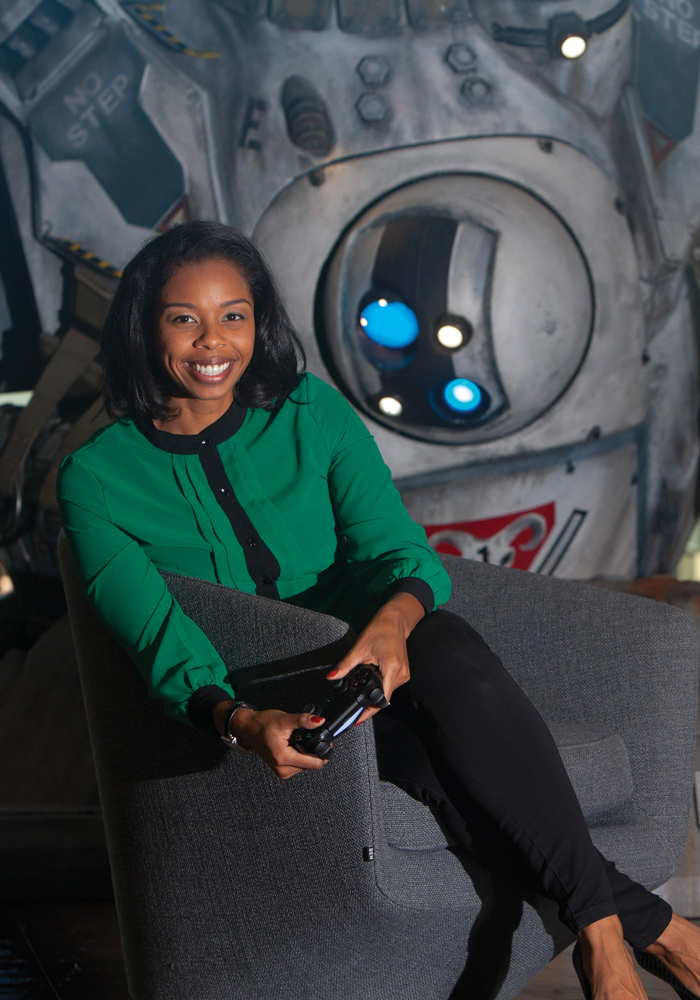Behind the Games
Alumna encourages other minority women to enter technology and engineering fields
 Feb. 15, 2017 - Gaming and entertainment giant Electronic Arts has a winning hand when it recruits new talent: Who would turn down a job that pays you to play games and create fun?
Feb. 15, 2017 - Gaming and entertainment giant Electronic Arts has a winning hand when it recruits new talent: Who would turn down a job that pays you to play games and create fun?
But it has another ace in the hole: software engineer and UCI alumna Laura Wright Teclemariam ’04, who attends as many recruitment events as she can.
“Recruiting isn’t part of my core job responsibilities,” says Teclemariam, senior product manager for Bay Area-based EA, “but I think it’s important for students to see a female minority in technology, so they realize some of us have made it into this field.”
She directs for EA’s internal engagement and advertising platform, a big job at this gaming superpower, which has 8,500 employees worldwide. Black Enterprise recently named her one of the top 10 African Americans in the video game industry.
Although gaming is popular with African Americans — according to Nielsen figures, they’re the second-largest ethnic group to play, after Asian Americans — only 2.5 percent of game developers are black.
The statistics are troubling. A Black Enterprise article says, “Not only are African American tech professionals missing out on obtaining some of the coolest jobs ever, but also there has been an issue with the stereotyping and negative portrayals of black characters in games.”
Like many African Americans in the field, Teclemariam hopes the tide will turn and is trying to help make that happen. “I take responsibility to pave the way for other young girls and boys of color, [to] let them know there are role models that look like them,” she says.
From Playing Pac-Man to Engineering
Her own entrance into the field was almost a fluke.
Raised by a single mother in Vallejo, Teclemariam always loved games, playing Pac-Man on an Atari 2800 when she was 5 years old. At 7, she learned to type on a computer when her mom bought a Xerox word processor.
In middle school, her mother bribed her into getting A’s by promising Nintendo video games as rewards. “I didn’t know at the time that I would enjoy working on video games as much as I enjoyed playing them,” Teclemariam says. And she certainly hadn’t considered it a possible career path.
In high school, she set her sights on becoming a doctor, which seemed to her to be the best path to the American dream. “My mother worked so hard,” she says. “I wanted to make her proud.”
There was just one problem, Teclemariam learned after taking a job at a local clinic that had a program for high school students interested in the medical field. The first time she saw blood drawn, she grew nauseated and nearly fainted. “Medicine definitely wasn’t for me,” Teclemariam says now, laughing at the memory.
Her career plan dissolved with that realization, and she reluctantly switched to engineering on the advice of her guidance counselor, who said she should take advantage of her high scores in science.
“I had no idea what type of work engineers do, so I went to the library and looked up careers in engineering,” Teclemariam says. But she was still fuzzy about what would come next. Her acceptance to UCI put her on track, along with an internship she scored at Microsoft’s satellite office in Irvine.
“I’m really proud that I received my degree from UCI,” Teclemariam says. “A decade or more ago, people would ask where the school was. But now people say, ‘Wow, that’s a great place.’ I’m proud of the way the university has grown its programs.”
Teclemariam earned a B.S. in electrical engineering with a minor in information & computer science. But it wasn’t easy. The year she started college, she was the only African American woman majoring in that field at UCI, she says.
“I’ve always had my mom’s tenacity and ability to push through,” Teclemariam says. “But it’s rough when you’re the only one. It was scary at first to feel alone culturally and not share any cultural moments with anyone in my department.”
 Motivation from UCI mentors such as Robin Jeffers, director of Undergraduate Student Affairs for UCI’s Henry Samueli School of Engineering, helped her thrive. She also became involved with the campus’s Center for Opportunities & Diversity in Engineering, which works specifically with women and underrepresented minorities.
Motivation from UCI mentors such as Robin Jeffers, director of Undergraduate Student Affairs for UCI’s Henry Samueli School of Engineering, helped her thrive. She also became involved with the campus’s Center for Opportunities & Diversity in Engineering, which works specifically with women and underrepresented minorities.
Jeffers was impressed by Teclemariam’s perseverance and strong leadership and communication skills. “She was collaborative, initiating several study groups that included students from a variety of backgrounds,” Jeffers says. “She brought the fun, but she made sure that work/studying was the priority.”
She recalls that Teclemariam tutored, mentored and worked with her peers at CODE. “She was competitive but not in the way that you normally hear about students competing,” Jeffers says. “It was always with the goal of everyone improving.”
College left a lasting impression on Teclemariam, along with many good memories. “I loved the clubs, the organizations, the resources that the university gave us,” she says. But she acknowledges the challenges: “It had been so rough that I cried when I crossed that stage at graduation.”
‘At a Crossroads’
Teclemariam spent the next two years at Deloitte Consulting in Costa Mesa, but her goals were evolving.
“I was at a crossroads,” she remembers. “I wondered about getting an MBA, but I felt like I belonged in the emerging field of entertainment tech. Social media was just getting started, and people were trying to figure out how to use it in terms of entertainment.”
She opted to strike out on her own, establishing Avid Exposure LLC, a North Hollywood startup that merged a digital company with a marketing and advertising agency. Among Teclemariam’s clients: Monster Energy and Interscope Geffen A&M Records.
“That startup made me the person I am today,” she says. “I learned so much about hiring, taxes, marketing, sales and operations — from A to Z. In retrospect, if I’d done some things differently, I’d be like Mark Zuckerberg now.”
Teclemariam managed Avid Exposure for five years, but her personal life was changing. She had gotten married, and her husband, Nerayo, a chemical engineer, had a job in the Bay Area. With two young daughters and a home in Northern California, Teclemariam had a long commute to the office in Southern California. So she reluctantly decided to close the business and move on. “I have empathy for any woman entrepreneur with kids,” she says.
But good things awaited in the Bay Area. Teclemariam became involved with Tapjoy, a $100 million startup, serving as product manager for its developer platform. And then two headhunters reached out from EA. “I thought, ‘Two headhunters? They must really want me,’” she says.
The company — known for such popular games as “Madden NFL,” “FIFA,” “Star Wars: Galaxy of Heroes” and “The Sims” — allowed her to get back into entertainment through video games. “It’s an exciting sector to talk about and be passionate toward every day,” Teclemariam says. “I decided to become a product manager because I wanted to be the customer’s voice and help the technical team build a product that customers will not only use, but love.”
She also plans to keep going to those recruiting events. “When I was growing up, girls were never targeted,” she says. “A lot of my efforts revolve around targeting them. Even if they don’t get a chance to talk to me, they can see my face. They can see there’s a woman of color there.”
- Rosemary McClure
